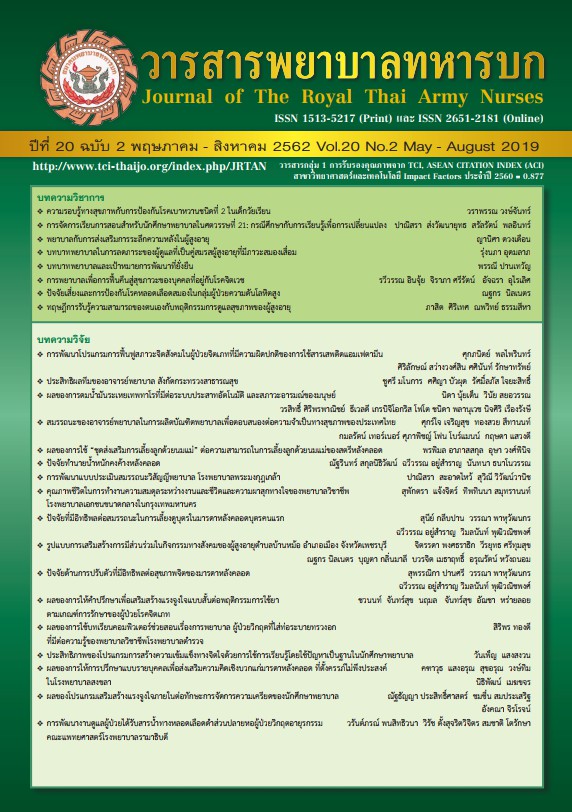The Curriculum for Nursing Students in The 21st Century: Case Study and Transformative Learning
Keywords:
Case Study, Transformative Learning, Lesson Learned in Century 21Abstract
Learning in the 21st century is the learning of constant change in the world. Now, nurses work in the complex health problems and more serious everyday, therefore the lesson learning wants to change the teaching methods that encourage learners to have more analytical thinking. Using case studies in combination with transformative learning has three main stages include stage 1 to present case study, stage 2 to determine their own transition planning and implementation, and stage 3 to implement and reform into new life. It helps to achieve internal critical self-reflection and to gain new experience and a profound understanding of own. The development of new nursing care plan differs from individual to consider a holistic approach to a real lifest7yle and contribute to the professional development of nursing.
Downloads
References
2. Panich W. Transformative learning. Bangkok: SR Printing Mass Products Company Limited; 2017. (in Thai)
3. Poohongthong C. Transformative learning: Challenges for instructors in higher education Journal of Behavioral Science. 2018; 24(1): 163-182. (in Thai)
4. Kunaviktikul W. Teaching and learning in the discipline of nursing in the 21st center. Nursing Journal. 2015; 42(2): 152-156. (in Thai)
5. Kosawanon S, Rungamornrat S, Panbangpra S. Effect of case study teaching method on critical thinking in nursing students. Journal of Nursing Science, 2015; 33(3): 99-108. (in Thai)
6. Apichutboonchock S. The development of a case study learning model for developing students nurses’ competency in the respiratory assessment in a newborn intensive care unit. Vajura Medical Journal. 2015; 59(3): 25-34. (in Thai)
7. Meebunmak Y, Chaiyoyingyong R, Phokhwang P. Transformative learning: Implementation in nursing education. Journal Chalermkarnchana. 2017; 4(1): 58-67. (in Thai)
8. Prajankett O. Transformative learning: Nursing education perspective. Journal of the Royal Thai Army Nurses. 2014; 15(3): 179-184. (in Thai)
9. Yokogawa M, Notoya M, Madokoro S. Transformative learning experience for physical therapy students through a community health promotion project for mothers of hearingchallenged children. The Journal of Physical Therapy Science. 2017; 29(4): 576-580. (in Thai)
10. Kitroongrueng P. The development of an instructional model using case based on science of teaching to enhance student teaches, critical teaching (Dissertation). Nakhonpathom, Silpakorn University; 2010. (in Thai)
11. Kaewprasert V. A study of analytical thinking and learning achievement via E-learning using case based learning method for undergraduate students of education program. Veridian E-Journal. 2014; 7(2): 947-961. (in Thai)
12. Jamjan L, Boonchoochuay R, Insing S. Transformative learning: Lesson learned from nursing education. Nursing Journal of the Ministry of Public Health. 2014; 24(3): 1-14. (in Thai)
13. Prajankett O. Transformative learning: Nursing education perspective. Journal of the Royal Thai Army Nurses. 2014; 15(3): 179-184. (in Thai)
14. Pakdeto R, Arpauchiratana C. An Application of transformative learning in arranging learning experience regarding ethical decision making for nursing students. Thai Red Cross Nursing Journal. 2016; 9(1): 1-10. (in Thai)
15. Ruth-Sahd L, Beck J, McCal C. Transformation learning during a nursing externship program: The reflections of senior nursing students. Nursing Education Perspectives. 2010; 31(2): 78-83.
16. Vatcharavongvan P. Transformative learning and medical teaching Thammasat Medical Journal 2014; 14(3): 449-459. (in Thai)
17. Gibbs G. Learning by doing: a guide to teaching and learning methods. London: Futher Education Unit; 1988.
18. Saraketrin A., Rongmuang D., Chantra R, Nursing Education in the 21st Century: Competencies and Roles of Nursing Instructors. Journal of The Royal Thai Army Nurses. 2019. 20(1):12-20. (in Thai)
Downloads
Published
How to Cite
Issue
Section
License
บทความหรือข้อคิดเห็นใดใดที่ปรากฏในวารสารพยาบาลทหารบกเป็นวรรณกรรมของผู้เขียน ซึ่งบรรณาธิการหรือสมาคมพยาบาลทหารบก ไม่จำเป็นต้องเห็นด้วย
บทความที่ได้รับการตีพิมพ์เป็นลิขสิทธิ์ของวารสารพยาบาลทหารบก
The ideas and opinions expressed in the Journal of The Royal Thai Army Nurses are those of the authors and not necessarily those
of the editor or Royal Thai Army Nurses Association.






